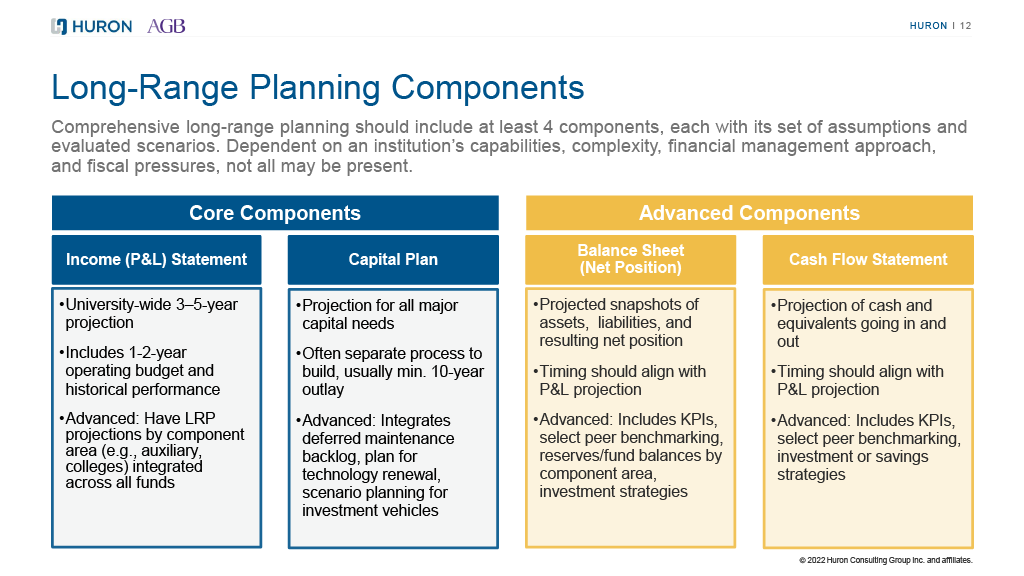
Opinions expressed in AGB blogs are those of the authors and not necessarily those of the institutions that employ them or of AGB.
AGB’s Council of Finance Committee Chairs held its third meeting virtually in January 2022. Below are the takeaways from this event.
AGB President and CEO Henry Stoever opened the meeting by recognizing the loss of the late Verne Sedlacek, a council member, former AGB Board of Directors member, and long-time leader in higher education and philanthropy, who passed away in December 2021.
This meeting focused on long-range budget planning’s relationship to strategic planning as well as aligning budgetary success and student success. As one attendee observed, a strategic plan without budget monies attached was more like a wish list; combining budget and strategic planning was more realistic. Long-range strategic and budget plans, as others noted, also needed flexibility to accommodate unexpected events (e.g., pandemic-related or natural-disaster-related expenses).
In addition, the board’s role in driving and pressure-testing long-range budgeting and strategic planning was emphasized. While a board should not micromanage, members can ask questions such as “How much will X cost initially and over time? What are the alternatives to X? Why is X a priority versus Y or Z?” in order to better understand different multiyear planning scenarios’ strengths and weaknesses.
The necessity of robust data to guide such conversations was also raised in relation to the discussion of long-range planning components, shown in the below figure. The discussion emphasized there being no single right or wrong long-range planning method given differences in institutional complexity, staff and technological capability, fiscal pressures, and approach to financial management.

©Huron Consulting Group. All Rights Reserved. May not be copied or used without express written permission of Huron.
More granularly, the discussion came to the following conclusions regarding long-term budget projections:
- Looking back at historical state funding levels provides public institutions guidance for realistic projections while taking into account the volatility of such funding from year to year;
- Looking back at historical performance as well as how particular areas or programs are currently performing against projections can serve as both an accountability mechanism and a prioritization method; and
- Looking simultaneously backward and forward to construct a coherent, data-supported narrative of where the institution/foundation has been and where the board and administration see it going provides a road map for the future.
The meeting closed out with Henry Stoever asking council members to consider the following questions regarding AGB’s strategic focus on student success:
- Definition: How would you define student success?
- Measurement: How would you propose student success be measured and reported to the board?
- Responsibility: Who is responsible for driving institutional achievement in this area?
- Resourcing: What level of resources will be required in the coming years to ensure student success initiatives are effective—and how might boards need to think about and/or engage with management differently around that question going forward?
Lesley McBain, PhD, is AGB’s director of research.
AGB thanks our partner Huron Consulting Group for its support of the Council of Board Finance Committee Chairs.
RELATED RESOURCES

Tools and Toolkits
Finance Committee Chair Toolkit

Reports and Statements
AGB Statement on Board Accountability

